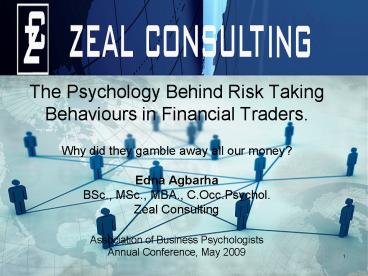The Psychology Behind Risk Taking - PowerPoint PPT Presentation
1 / 19
Title:
The Psychology Behind Risk Taking
Description:
Cognitive and emotions drivers associated with taking risky decision ... Hubris: omnipotence and omniscience, gods of the universe ' ... – PowerPoint PPT presentation
Number of Views:149
Avg rating:3.0/5.0
Title: The Psychology Behind Risk Taking
1
- The Psychology Behind Risk Taking
- Behaviours in Financial Traders.
- Why did they gamble away all our money?
- Edna Agbarha
- BSc., MSc., MBA., C.Occ.Psychol.
- Zeal Consulting
- Association of Business Psychologists
- Annual Conference, May 2009
2
Todays Agenda
- Background context
- Define risk
- Research questions
- Literature review
- Research methodology
- Selected key findings case study
- Cognitive and emotions drivers associated with
taking risky decision - Discuss practical HR implications
3
Background Historical Context
- Thatcherism Reagan
- Tough times rising inflation, unemployment,
interest rates, bureaucratic govt. - Tough measures Privatisation, state budget cuts,
moves against labour, deregulated financial
markets - Boom-Bust of 80s 90s
- Banking finance contribution to GDP
- Start of slippery slope
4
Background Research Context
- Increased higher-risk lending
- Subprime mortgage crisis in USA 2006/7
- Banks hit
- Lack of capital and liquidity
- Global repercussions and economic uncertainty
- Global credit crunch
- Panicked investors and savers
- Job losses and redundancies!
5
Defining Risk
Risk taking a decision with some uncertainty
associated with the decision variables a
probability that returns may either increase or
decrease and an expectation of how much the
potential variability in returns is likely change
(Dembo Freeman,1998).
- Why do people take risks?
- Can risk be managed? If so, how?
- What is a market?
- Can a market ever be free of risk?
- What is the process by which risky decisions are
taken? - Can the quality of risk taking be improved? If
so, how? - Risk appetite whats yours? Seeking, neutral or
averse?
6
Research Questions
- Which cognitive biases have the biggest impact on
risk taking and trading performance? - How do emotions affect risk taking?
- What personality traits help or hinder trading
performance? - What learning strategies do traders adopt in
order to cope with financial losses?
7
Summary of Literature Review
- Rational beings
- Emerging field of Behavioural Finance
- Psychological Biases tendencies to
behave/think/feel a particular way - Systematic cognitive processes when trading
- Heuristics cognitive shortcuts employed to
enable information processing - Cognitive biases
- Bounded Rationality
- Hindsight Bias
- Emotional biases
- Mood Maintenance
8
Expected Utility Theory
- Bernoulli (1954) decision makers choosing between
risky or - uncertain options will compare the expected
utility. - There is a basic assumption that decision makers
are rational - and therefore will choose the option with the
highest utility. - (Comparing the expected utility values by adding
the utility - values multiplied by their respective
probabilities). - I can calculate the motions of heavenly bodies,
- but not the madness of people."
- Sir Isaac Newton (1721).
9
Testing Expected Utility Theory
- Gambling activity
- Groups of 4/5
- Two gambling opportunities A B
- Which gamble should you take?
- 5 minutes
10
Prospect Theory
Value
A descriptive model of decision making under risk
Framing Effects
Losses
Gains
0
Risk Neutrality
Source Psychologists Kahneman Tversky (1979)
Value -
11
Methodology Composition of Participants
12
Methodology Data Collection
- Critical Incident an event in which there is a
large gap between expectation and experience,
which produces a significant emotional change.
(Flanagan, 1954). - 19 in-depth semi-structured interviews using
critical incident technique - Context, reasons for taking risk, risk
management, cognitive emotional drivers,
learning mistakes, coping strategies. - Thematic Analysis
- QSR NVivo software
- Personality questionnaires
13
Findings Six Emerging Themes
- Distinct trader personality profiles
- Emotional effect of monetary gains or losses
- Limited support for different cognitive biases
- Type of learning depends on the outcome (whether
ve or ve) - Controlling emotions is perceived to lead to
positive outcome - Use of intuitive judgement rather than financial
science
Findings Four Personality Types
- Type 1 Bold Impulsive (n 3)
- Type 2 Driven Optimist (n 7)
- Type 3 Driven Reviewer (n4)
- Type 4 Measured Calculator (n3)
14
Findings Classification of Emotions
15
Findings Emotions and Money
16
Some Conclusions
- Cognitive
- No evidence of Hindsight Bias
- Emotional
- Little evidence to support Mood Maintenance
- Frequent mistakes made by traders are the
tendency to be overcautious or overly impulsive - Internal regulation of emotions
17
Whos to Blame?
- The scale of failure ranges from financial
institutions failing to national - economic meltdown
- Mix of trader backgrounds lots of power
authority devolved - Pantheon of highly intelligent risk takers who
have surprisingly become unstuck - Demise and near collapse of Long Term Capital
Management (LTCM) a highly-respected
prestigious hedge fund founded 94 - Hubris omnipotence and omniscience, gods of the
universe - Do not think of yourself more highly than you
ought, but rather think of yourself with sober
judgement. (Romans 123) - Baring Brothers and Co bank - Nick Leeson
- Société Générale - Jerome Kerviel
- Northern Rock, RBS
- Iceland and Belgium
18
Contact Details
- Edna Agbarha - Zeal Consulting
- Mobile 07956 945 775
- edna_agbarha_at_hotmail.com
- Feel free to leave your details for slides,
flips, handouts, further information and more
details. - Website www.zealconsulting.biz (coming soon!)
19
(No Transcript)































